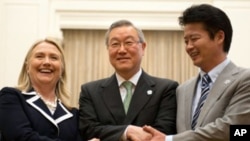PHNOM PENH — Southeast Asian ministers have failed to reach a common position on the maritime dispute involving the South China Sea. Senior officials emerged from a forum of the Association of Southeast Asian Nations, unable to reach their goal of hammering out a joint statement representing the members’ views on the issue.
ASEAN foreign ministers have been attempting all week to craft a statement summarizing its members' position on territorial disputes in the South China Sea. But when senior ministers emerged from the Asean Regional Forum Thursday - the pinnacle of this week’s meetings - disappointment was evident.
Indonesian Foreign Minister Marty Natalegawa said it was “irresponsible” that ASEAN nations have not come up with a common statement.
“Whenever there are incidents, that’s actually the moment that we should reinforce our efforts, not be grinding to a halt," said Natalegawa. "This time last year we had a similar problem between Cambodia and Thailand - it was a more direct intra-ASEAN conflict, but it was not impossible to find a solution within ASEAN. And in this instance it’s, I find it perplexing, and to be candid and honest, really, really disappointing.”
Four ASEAN members - Brunei, Malaysia, the Philippines and Vietnam - claim overlapping parts of the South China Sea. China claims almost all of the sea and there have been frequent confrontations over the region. A decade ago, ASEAN and China agreed to work together to develop a code of conduct of operations in the sea. But China wants to settle territorial disputes with individual nations, not the bloc as a whole.
Earlier this week, ASEAN members said they had agreed in principle on “key elements” of a code, and would approach China about opening negotiations.
Late Thursday, ASEAN Secretary-General Surin Pitsuwan indicated there is a chance of some sort of agreement on a statement by the end of the week. He downplayed the setback.
“But I think all the dialogue partners, all the major powers are still supporting and expecting ASEAN to take the leading role," said Pitsuwan. "In that sense I think they will have to give the space for ASEAN to move in the direction of constructive and positive and contributing to the process. This time it’s a hiccup within the ASEAN group. We could not find one common position on just one issue. The rest is O.K.”
Coming into this week’s meetings, analysts predicted tensions about the South China Sea would form a major part of discussions here.
This week also saw a dispute emerge beyond ASEAN’s boundaries. Japan lodged a formal protest with China, after Chinese vessels approached a group of small islands that Japan controls, but China claims.
This week’s meetings conclude on Friday. A leaders’ summit is scheduled for November.




